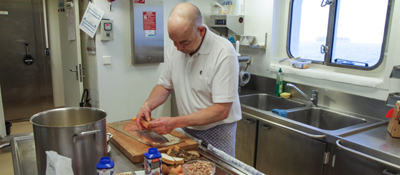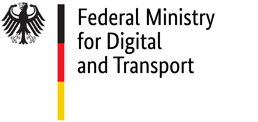Referat ISM/ILO - Bereich Seearbeitsrecht
Brandstwiete 1
20457 Hamburg
Fax: +49 40 361 37-204

Tilo Berger
Phone: +49 40 361 37-213
Mail: ism-mlc@bg-verkehr.de

Sven Reese
Phone: +49 40 361 37-313
Mail: ism-mlc@bg-verkehr.de

Kathrin Saß
Phone: +49 40 361 37-260
Mail: ism-mlc@bg-verkehr.de

Florian Reise
Phone: +49 40 361 37-214
Mail: ism-mlc@bg-verkehr.de
On-board • Ashore
Provisions of the Maritime Labour Convention (MLC) regarding on-board accommodation for seafarers apply to new ships only
The MLC contains detailed provisions regarding the standard of on-board accommodation for seafarers, e. g. minimum size of sleeping rooms. Generally seafarers are entitled to their personal sleeping room. Deviations from these requirements are possible in ships of less than 3,000 GT, special purpose ships, passenger ships and fishing vessels.
The new provision apply only to ships constructed after the entry into force of the MLC. In opposite the ILO-Conventions No. 92 and 133 apply to older existing ships.
The detailed provisions of the MLC regarding on-board accommodation are implemented in German law by means of the new Ordinance on Accommodation in Maritime Shipping (See-Unterkunftsverordnung). This includes also further provisions, e.g. that two apprentices may share one sleeping room provided it is fitted with a bathroom and a toilet.

Ship’s cook is mandatory on ships with a prescribed manning of at least ten
Seafarers are entitled to food of appropriate quality and quantity free of charge and to drinking water during their period of employment. Appropriate food ensures suitable and balanced nutrition regarding nutritional value, quality and variety. The more detailed requirements in the former „Verordnung über die Speiserolle“ have been abandoned due to the continuous change in nutritional habits.
In future a ship’s cook is required, if the safe manning certificate prescribes a manning of at least ten. Proof of qualification as a ship’s cook on a German-flagged seagoing ship can be either:
- professional training as a cook, or
- a catering course provided by a chamber of industry and commerce, or
- a certificate of qualification as a ship’s cook issued by a foreign state.
Shipowner must ensure free of charge repatriation of seafarers
A seafarer on a German-flagged ship is entitled to repatriation, if:
- he is ill or injured to such an extent that he is unfit for work and abandoned abroad,
- the employment terminates,
- the shipowner does no longer fulfil his obligations by reason of insolvency or sale of the ship,
- if a ship is bound for a war zone (a war zone does not include areas affected by piracy).
The shipowner must provide a bank guarantee or an insurance confirmation of a P&I club to ensure repatriation of seafarers even in case of insolvency of the shipowner.
Seafarers are entitled to annual leave of at least 30 calendar days
Seafarers are entitled to 30 calendar days of leave for each year of employment. Not to be included are:
- public holidays which apply in the home port of the ship,
- periods of unfitness for work due to illness or accident and maternity leave,
- shore leave,
- compensation for work on Sundays and public holidays.
The shipowner must pay travel expenses for reaching the holiday destination and for the return to the ship.
Immigration clearance
The federal police, the waterway police (only in Hamburg) and, in smaller German ports, customs issue an immigration clearance with a certificate for incoming vessels if seafarers want to go on shore leave (commonly known as shore leave passes although theses are now issued collectively). The immigration clearance is only valid for the area of the town or city of the port.

